状语从句详细讲解与练习
- 格式:ppt
- 大小:3.95 MB
- 文档页数:98
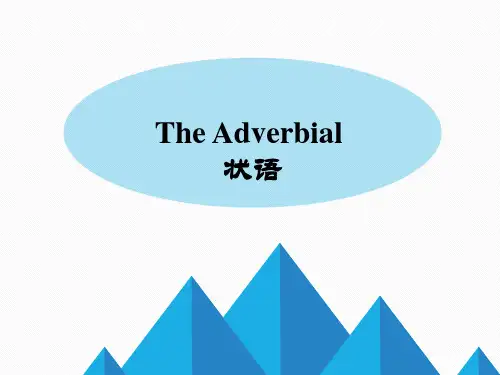
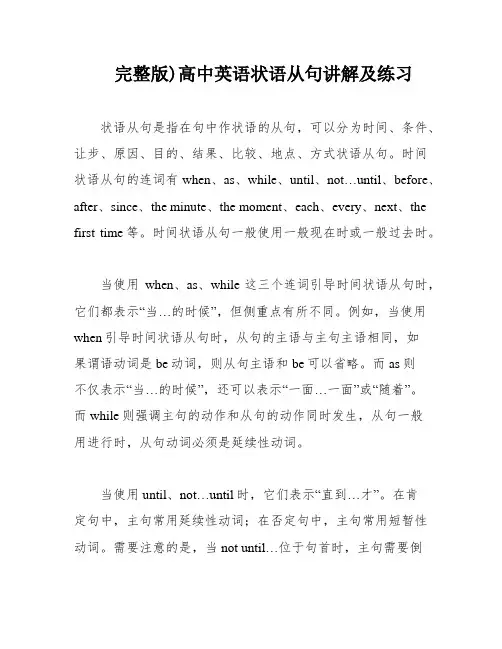
完整版)高中英语状语从句讲解及练习状语从句是指在句中作状语的从句,可以分为时间、条件、让步、原因、目的、结果、比较、地点、方式状语从句。
时间状语从句的连词有when、as、while、until、not…until、before、after、since、the minute、the moment、each、every、next、the first time等。
时间状语从句一般使用一般现在时或一般过去时。
当使用when、as、while这三个连词引导时间状语从句时,它们都表示“当…的时候”,但侧重点有所不同。
例如,当使用when引导时间状语从句时,从句的主语与主句主语相同,如果谓语动词是be动词,则从句主语和be可以省略。
而as则不仅表示“当…的时候”,还可以表示“一面…一面”或“随着”。
而while则强调主句的动作和从句的动作同时发生,从句一般用进行时,从句动词必须是延续性动词。
当使用until、not…until时,它们表示“直到…才”。
在肯定句中,主句常用延续性动词;在否定句中,主句常用短暂性动词。
需要注意的是,当not until…位于句首时,主句需要倒装。
例如,“Not until you had explained how did I manage to do it.”It was dark when he finally returned。
XXX the machine type upon seeing it。
As soon as I arrived home。
it began to rain。
Hardly had I arrived home when it began to rain。
XXX: real XXX: if。
even if/though。
unless/if。
not。
as long as/so long as。
as far as/so far as。
provided/providing(that)。
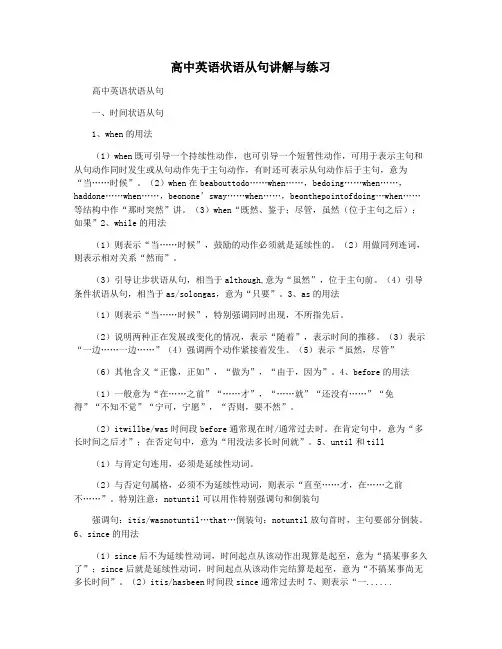
高中英语状语从句讲解与练习高中英语状语从句一、时间状语从句1、when的用法(1)when既可引导一个持续性动作,也可引导一个短暂性动作,可用于表示主句和从句动作同时发生或从句动作先于主句动作,有时还可表示从句动作后于主句,意为“当……时候”。
(2)when在beabouttodo……when……,bedoing……when……,haddone……when……,beonone’sway……when……,beonthepointofdoing…when……等结构中作“那时突然”讲。
(3)when“既然、鉴于;尽管,虽然(位于主句之后);如果”2、while的用法(1)则表示“当……时候”,鼓励的动作必须就是延续性的。
(2)用做同列连词,则表示相对关系“然而”。
(3)引导让步状语从句,相当于although,意为“虽然”,位于主句前。
(4)引导条件状语从句,相当于as/solongas,意为“只要”。
3、as的用法(1)则表示“当……时候”,特别强调同时出现,不所指先后。
(2)说明两种正在发展或变化的情况,表示“随着”,表示时间的推移。
(3)表示“一边……一边……”(4)强调两个动作紧接着发生。
(5)表示“虽然,尽管”(6)其他含义“正像,正如”,“做为”,“由于,因为”。
4、before的用法(1)一般意为“在……之前”“……才”,“……就”“还没有……”“免得”“不知不觉”“宁可,宁愿”,“否则,要不然”。
(2)itwillbe/was时间段before通常现在时/通常过去时。
在肯定句中,意为“多长时间之后才”;在否定句中,意为“用没法多长时间就”。
5、until和till(1)与肯定句连用,必须是延续性动词。
(2)与否定句属格,必须不为延续性动词,则表示“直至……才,在……之前不……”。
特别注意:notuntil可以用作特别强调句和倒装句强调句:itis/wasnotuntil…that…倒装句:notuntil放句首时,主句要部分倒装。
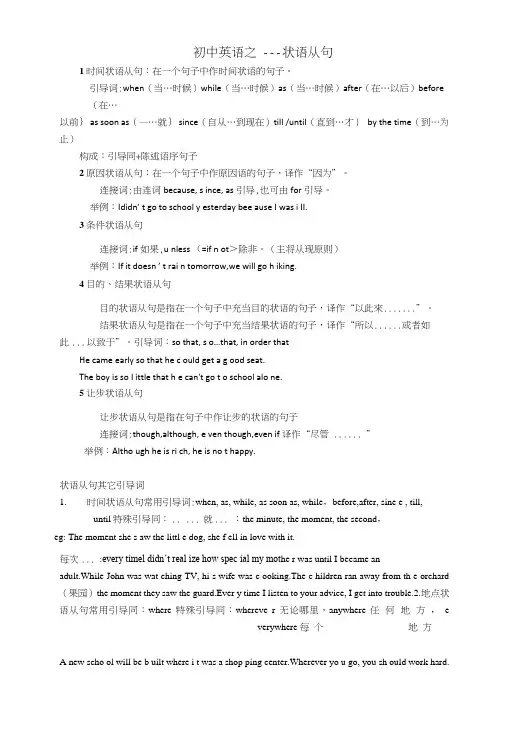
初中英语之 --- 状语从句1时间状语从句:在一个句子中作时间状语的句子。
引导词:when(当…时候)while(当…时候)as(当…时候)after(在…以后)before(在…以前} as soon as(—…就} since(自从…到现在)till /until(直到…才}by the time(到…为止)构成:引导同+陈述语序句子2原因状语从句:在一个句子中作原因语的句子,译作“因为”。
连接词:由连词because, s ince, as引导,也可由for引导。
举例:Ididn’ t go to school y esterday bee ause I was i II.3条件状语从句连接词:if如果,u nless (=if n ot>除非。
(主将从现原则)举例:If it doesn ’ t rai n tomorrow,we will go h iking.4目的、结果状语从句目的状语从句是指在一个句子中充当目的状语的句子,译作“以此來.......”。
结果状语从句是指在一个句子中充当结果状语的句子,译作“所以......或者如此... 以致于”。
引导词:so that, s o…that, in order thatHe came early so that he c ould get a g ood seat.The boy is so I ittle that h e can't go t o school alo ne.5让步状语从句让步状语从句是指在句子中作让步的状语的句子连接词:though,although, e ven though,even if 译作“尽管 ...... ”举例:Altho ugh he is ri ch, he is no t happy.状语从句其它引导词1.时间状语从句常用引导词:when, as, while, as soon as, while,before,after, sine e , till,until 特殊引导同:.. ... 就... :the minute, the moment, the second,eg: The moment she s aw the littl e dog, she f ell in love with it.每次... :every timel didn’t real ize how spec ial my mot he r was until I became anadult.While John was wat ching TV, hi s wife was c ooking.The c hildren ran away from th e orchard (果园)the moment they saw the guard.Ever y time I listen to your advice, I get into trouble.2.地点状语从句常用引导同:where特殊引导同:whereve r无论哪里,anywhere 任何地方,everywhere 每个地方A new scho ol will be b uilt where i t was a shop ping center.Wherever yo u go, you sh ould work hard.状语从句练习单项选择1.John does n't letever ybodyinthe kitchen __________ h e could makehis sur prisedinner fortheparty.A. which B. when C. so that D. as if 2.I wouldt hankit __________ you call back this a fternoon for the doctor5 smeeting.A.until B. if C. when D. that3.Asfar as Iam concerned (就我而言),education is about learning and the more you learn,—____ A. the betterlife will you get B. the betterlife you will ge tC. you will get the bet ter lifeD.will you get the bet ter life4.Af ter the war, a new school wasbuilt _____________ t here had once be en(曾经有)a theatre.A. that B. where C . which D. whe n5.—Is Mr.Smith in the office?—Yes , __________ he is in charg e of the office, he mustbe there.A.since B. how ever C. whether D. for 6.As your good friendJ will do ____________help you.A. that I can to B. what I canto C. all that I can D. what I can7.Someone called me up in the middle ofthe night, b ut they hung up(挂断电话)____________ I coul d answer the phone.A.as B.since C. until D. before8.We must hurry up __________catchup with the last train.A. that B. so that to C. in order that D. in ord er toLondon 9.No m atter ________ h ard it ma y be, I will carry it out .A. what B. whatev er C.how D. however 1 0. _________you may do, you must do itwell.A. Which B.Whenever C. What ever D.WhenM. ________ you are so weak, you’d better sta y at home.A.Since B. For C. B ecause D. Though 1 5.1saw Mr.Smith last S unday. We had not seen each other ____________ I left .A. as B. before C.since D. till 16.1’11 be back before you ________ .A.will leave B will have left C.leave D. would lea vel7.If the weather ____________ tomor row, we will go picnic i n the centra 1 park.A wil 1 be fine Bis fine Cis going to be fine D h ave been fine18. ________________________ They wen t on working it was late at night.A. eve n if B.as if C. however D. as tho ughl9.l hurr ied _____________ I wouldn't b e late for c lass.A. sine e B. sotha t C.as if D . unless20.T he volleybal I match will be put off if it __________ .A. will r ain B. rain s C. r ained D. is raining【实例解析】1.(2004年北京市海淀区中考试题)You will sta y healthy ________ you do more exerci se, such as running and walking.A.ifB. howC. beforeD. where2.(2004年江丙省中考试题)…Shall we go on wor king?Ye s, _________ I prefer to have a rest.A. whenB. ifC. be causeD. th ough3.(2004年徐州市中考试题)N one of us kn ew what had happened ___________ they told us abo ut it.A. w henB. unti IC. afterD. though4.(2004年泉州市中考试题)••-1 ho pe you’ll en joy your tri p, dear!—Thank you,mum. Til gi ve you a cal I ___________ I get there.A. untilB. as soon a sC. sinceD. till【中考演练】一.单项填空1. ______ he z s old, he c an still car ry this heav y bag.A. T houghB. Si neeC. ForD. So2.•■-Do you know if he ______ to play ba sket ball wi th us?---1 think he wi II come if h e _______ fre e tomorrow.A. comes; i sB. comes;will beC.will come;isD. will come; will b e3.In the z oo if a chil d _____ into the water a nd can't swi m, the dolph ins may come up _________ him.A. will fall; to he IpB. fall s; to helpC. will fall; help D . falls; hel ping4.1don z t remember _________ he worked in th at city when he was youn g.A. whatB. which C . where D.who5.We wil I stay at ho me if my aunt __________ to visit us t omorrow.esB. c omeC. will comeD. is coming6.Th e police ask ed the child ren _______ cross the st reet _________ the traffi c lights tur ned green.A. not; befo reB. don't; whenC. n ot to; untilD. not; af ter7.1was late for cla ss yesterday ________ t he re was somet hing wrong w ith my bike.A. when B . that C. u ntil D. bee ause8.I’ll go swimming with you if I _________ f ree tomorrow .A. will b eB. shall beC. am D . was9.In t he exam, the ________ yo u are, _______ the ________ mistakes y ou will make .A. carefu I; littleB. more ca reful; fewes tC. more c areful; fewe rD. more c a ref u I; less10.You shou Id finish yo ur lessons _______ you g o out to pal y.A. beforeB. afterC. whenD.while11.1hurried _____ I wouldn't be late for class.A.sinceB. s o thatC. a s ifD. uni ess12.When you read the book, you'd better make a mark ________ you have any questio ns.A. whi chB. thatC. where D . though13.The teacher raised his v oice ________ a ll the stu dents could hear him.A. forB. s o thatC. b ecauseD. i n order14.H e took off h is coat ________ h e felt hot.A. be causeB. asC. ifD.since15.It is ______ th at we'd like to go out f or a walk.A. a lovely dayB. t oo lovely a dayC. so lovely a dayD. such Io vely a day16 . Mary had _______ m uch w ork to do th at she staye d at her off ice all day.A. suchB.soC. tooD. very17.______ I fel t very tired , I tried to finish the work.A. AlthoughB.BecauseC.AsD. As if18.______ t he day went on, the weat her got wors e.A. WithB. SinceC. WhileD.As19.______ well you c an drive, yo u must drive carefully.A. So long asB.ln order tha tC. No ma tter how D . The momentBeijing20. Write to me as soon as you _________ to.A . will get B. get C. g etting D. g ot二.根据中文意思完成下列英语句子1.不管他跟我开什麽玩笑,我都不生气。
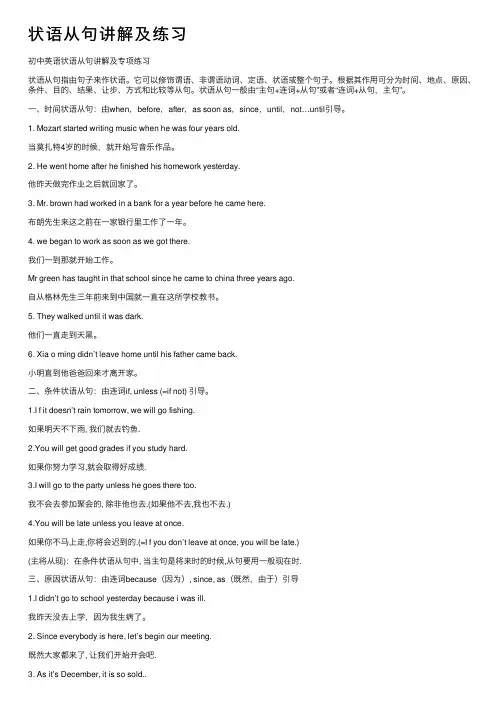
状语从句讲解及练习初中英语状语从句讲解及专项练习状语从句指由句⼦来作状语。
它可以修饰谓语、⾮谓语动词、定语、状语或整个句⼦。
根据其作⽤可分为时间、地点、原因、条件、⽬的、结果、让步、⽅式和⽐较等从句。
状语从句⼀般由“主句+连词+从句”或者“连词+从句,主句”。
⼀、时间状语从句:由when,before,after,as soon as,since,until,not…until引导。
1. Mozart started writing music when he was four years old.当莫扎特4岁的时候,就开始写⾳乐作品。
2. He went home after he finished his homework yesterday.他昨天做完作业之后就回家了。
3. Mr. brown had worked in a bank for a year before he came here.布朗先⽣来这之前在⼀家银⾏⾥⼯作了⼀年。
4. we began to work as soon as we got there.我们⼀到那就开始⼯作。
Mr green has taught in that school since he came to china three years ago.⾃从格林先⽣三年前来到中国就⼀直在这所学校教书。
5. They walked until it was dark.他们⼀直⾛到天⿊。
6. Xia o ming didn’t leave home until his father came back.⼩明直到他爸爸回来才离开家。
⼆、条件状语从句:由连词if, unless (=if not) 引导。
1.I f it doesn’t rain tomorrow, we will go fishing.如果明天不下⾬, 我们就去钓鱼.2.You will get good grades if you study hard.如果你努⼒学习,就会取得好成绩.3.I will go to the party unless he goes there too.我不会去参加聚会的, 除⾮他也去.(如果他不去,我也不去.)4.You will be late unless you leave at once.如果你不马上⾛,你将会迟到的.(=I f you don’t leave at once, you will be late.)(主将从现):在条件状语从句中, 当主句是将来时的时候,从句要⽤⼀般现在时.三、原因状语从句:由连词because(因为), since, as(既然,由于)引导1.I didn’t go to school yesterday because i was ill.我昨天没去上学,因为我⽣病了。
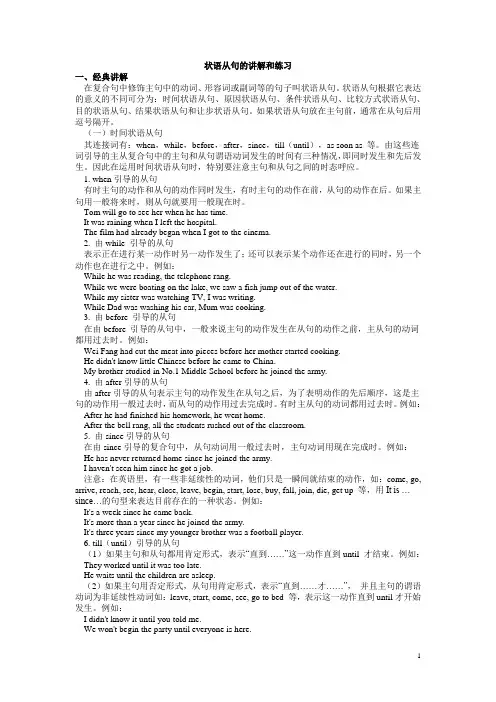
状语从句的讲解和练习一、经典讲解在复合句中修饰主句中的动词、形容词或副词等的句子叫状语从句。
状语从句根据它表达的意义的不同可分为:时间状语从句、原因状语从句、条件状语从句、比较方式状语从句、目的状语从句、结果状语从句和让步状语从句。
如果状语从句放在主句前,通常在从句后用逗号隔开。
(一)时间状语从句其连接词有:when,while,before,after,since,till(until),as soon as 等。
由这些连词引导的主从复合句中的主句和从句谓语动词发生的时间有三种情况,即同时发生和先后发生。
因此在运用时间状语从句时,特别要注意主句和从句之间的时态呼应。
1. when引导的从句有时主句的动作和从句的动作同时发生,有时主句的动作在前,从句的动作在后。
如果主句用一般将来时,则从句就要用一般现在时。
Tom will go to see her when he has time.It was raining when I left the hospital.The film had already began when I got to the cinema.2. 由while 引导的从句表示正在进行某一动作时另一动作发生了;还可以表示某个动作还在进行的同时,另一个动作也在进行之中。
例如:While he was reading, the telephone rang.While we were boating on the lake, we saw a fish jump out of the water.While my sister was watching TV, I was writing.While Dad was washing his car, Mum was cooking.3. 由before 引导的从句在由before 引导的从句中,一般来说主句的动作发生在从句的动作之前,主从句的动词都用过去时。
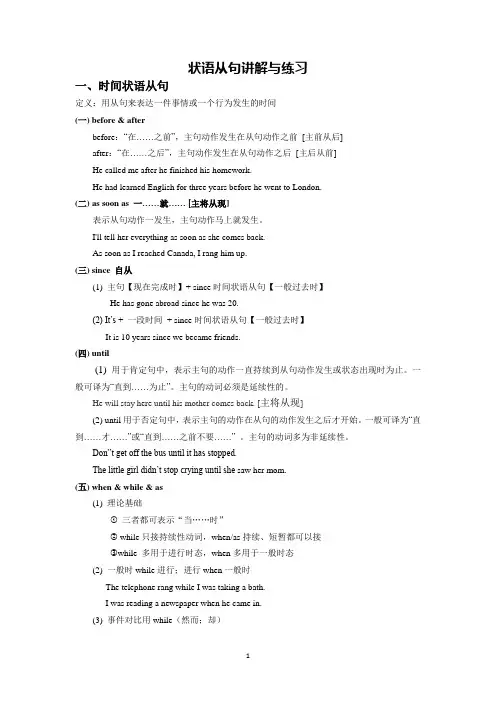
状语从句讲解与练习一、时间状语从句定义:用从句来表达一件事情或一个行为发生的时间(一) before & afterbefore:“在……之前”,主句动作发生在从句动作之前[主前从后]after:“在……之后”,主句动作发生在从句动作之后[主后从前]He called me after he finished his homework.He had learned English for three years before he went to London.(二)as soon as 一……就…… [主将从现]表示从句动作一发生,主句动作马上就发生。
I'll tell her everything as soon as she comes back.As soon as I reached Canada, I rang him up.(三) since 自从(1) 主句【现在完成时】+ since时间状语从句【一般过去时】He has gone abroad since he was 20.(2) It’s + 一段时间+ since时间状语从句【一般过去时】It is 10 years since we became friends.(四) until(1) 用于肯定句中,表示主句的动作一直持续到从句动作发生或状态出现时为止。
一般可译为“直到……为止”。
主句的动词必须是延续性的。
He will stay here until his mother comes back. [主将从现](2) until用于否定句中,表示主句的动作在从句的动作发生之后才开始。
一般可译为“直到……才……”或“直到……之前不要……” 。
主句的动词多为非延续性。
Don”t get off the bus until it has stopped.The little girl didn’t stop crying until she saw her mom.(五) when & while & as(1) 理论基础①三者都可表示“当……时”② while只接持续性动词,when/as持续、短暂都可以接③while 多用于进行时态,when多用于一般时态(2) 一般时while进行;进行when一般时The telephone rang while I was taking a bath.I was reading a newspaper when he came in.(3) 事件对比用while(然而;却)Father was preparing a report while I was playing PC games.He likes coffee while she likes tea.(4) “随着”/“一边…一边”用asThings are getting better and better as time goes on.She sang as she went along.二、原因状语从句because 因为(不与so连用)(1) because &because ofbecause引导原因状语从句because of 是介词短语,后跟n./pron./V-ing,句中作原因状语-- Why didn't he come here?-- He didn’t come here because he was ill.-- He didn’t come here because of his illness.(2) because & for & since & asbecause 语气最强烈;for放句中,用来表示一种附带或补充解释、说明;since & as 通常放句首,作“既然”讲。
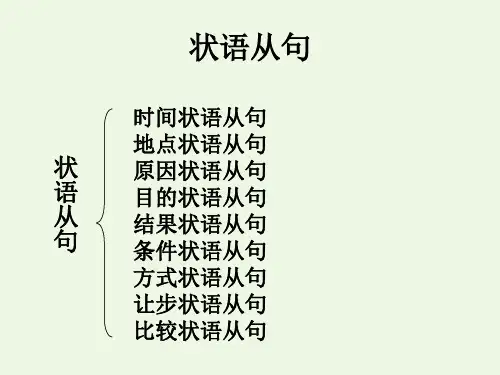
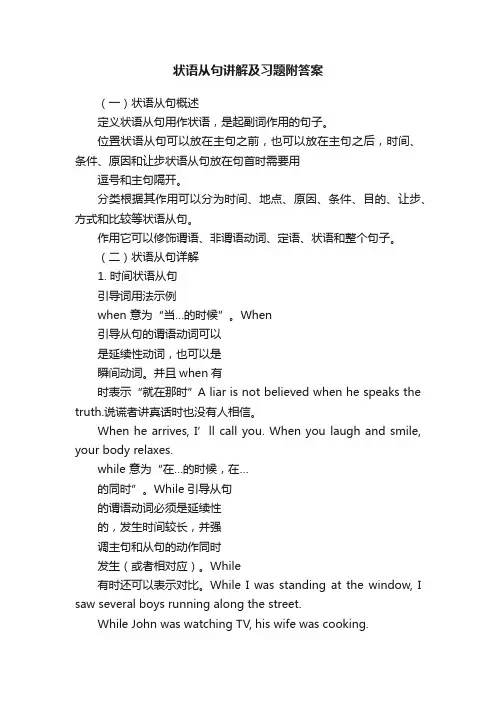
状语从句讲解及习题附答案(一)状语从句概述定义状语从句用作状语,是起副词作用的句子。
位置状语从句可以放在主句之前,也可以放在主句之后,时间、条件、原因和让步状语从句放在句首时需要用逗号和主句隔开。
分类根据其作用可以分为时间、地点、原因、条件、目的、让步、方式和比较等状语从句。
作用它可以修饰谓语、非谓语动词、定语、状语和整个句子。
(二)状语从句详解1. 时间状语从句引导词用法示例when 意为“当…的时候”。
When引导从句的谓语动词可以是延续性动词,也可以是瞬间动词。
并且when有时表示“就在那时”A liar is not believed when he speaks the truth.说谎者讲真话时也没有人相信。
When he arrives, I’ll call you. When you laugh and smile, your body relaxes.while 意为“在…的时候,在…的同时”。
While引导从句的谓语动词必须是延续性的,发生时间较长,并强调主句和从句的动作同时发生(或者相对应)。
While有时还可以表示对比。
While I was standing at the window, I saw several boys running along the street.While John was watching TV, his wife was cooking.as 意为“一边…一边…”。
As引导的动作是延续性的,发生时间较短,一般用于主句和从句动作同时发生;as也可以强调一前一后。
The writer was angry as he was travelling on a train to London because someone had invaded his “space”.He smiled as he stood up.after 意为“在…之后”。

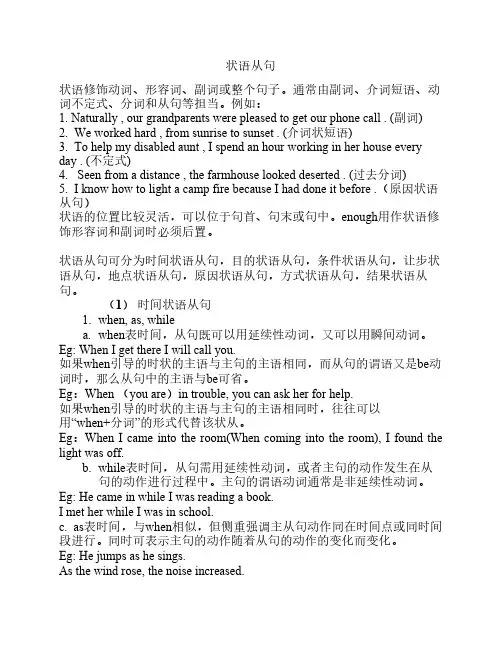
状语从句状语修饰动词、形容词、副词或整个句子。
通常由副词、介词短语、动词不定式、分词和从句等担当。
例如:1. Naturally , our grandparents were pleased to get our phone call . (副词)2. We worked hard , from sunrise to sunset . (介词状短语)3. To help my disabled aunt , I spend an hour working in her house every day . (不定式)4. Seen from a distance , the farmhouse looked deserted . (过去分词)5. I know how to light a camp fire because I had done it before .(原因状语从句)状语的位置比较灵活,可以位于句首、句末或句中。
enough用作状语修饰形容词和副词时必须后置。
状语从句可分为时间状语从句,目的状语从句,条件状语从句,让步状语从句,地点状语从句,原因状语从句,方式状语从句,结果状语从句。
(1)时间状语从句1. when, as, whilea. when表时间,从句既可以用延续性动词,又可以用瞬间动词。
Eg: When I get there I will call you.如果when引导的时状的主语与主句的主语相同,而从句的谓语又是be动词时,那么从句中的主语与be可省。
Eg:When (you are)in trouble, you can ask her for help.如果when引导的时状的主语与主句的主语相同时,往往可以用“when+分词”的形式代替该状从。
Eg:When I came into the room(When coming into the room), I found the light was off.b. while表时间,从句需用延续性动词,或者主句的动作发生在从句的动作进行过程中。
状语从句主要用来修饰主句或主句的谓语。
一般可分为九大类,分别表示时间、地点、原因、目的、结果、条件、让步、比较和方式。
尽管种类较多,但由于状语从句与汉语结构和用法相似,所以理解和掌握它并不难。
状语从句的关键是要掌握引导不同状语从句的常用连接词和特殊的连接词即考点。
现分别列举如下:1、时间状语从句常用引导词:when, as, while, as soon as, while, before, after, since , till, until特殊引导词:the minute, the moment, the second, every time, the day,the instant, immediately , directly, no sooner … than, hardly …when, scarcely … whenI didn't realize how special my mother was until I became an adult.While John was watching TV, his wife was cooking.The children ran away from the orchard(果园) the moment they saw the guard.No sooner had I arrived home than it began to rain.Every time I listen to your advice, I get into trouble.2、地点状语从句常用引导词:where特殊引导词:wherever, anywhere, everywhereGenerally, air will be heavily polluted where there are factories.Wherever you go, you should work hard.3、原因状语从句常用引导词:because, since, as, for特殊引导词:seeing that, now that, in that, considering that, given that, considering that, as much as, so much asMy friends dislike me because I'm handsome and successful.Now that everybody has come, let's begin our conference.The higher income tax is harmful in that it may discourage people from trying to earn more.Considering that he is no more than 12 years old, his height of 1.80 m is quite remarkable.4、目的状语从句常用引导词:so that, in order that特殊引导词:lest, in case, for fear that,in the hope that, for the purpose that, to the end thatThe boss asked the secretary to hurry up with the letters so that he could sign them.The teacher raised his voice on purpose that the students in the back could hear more clearly.5、结果状语从句常用引导词:so that, so… that, such … that,特殊引导词:such that, to the degree that, to the extent that, to such a degree that, He got up so early that he caught the first bus.It's such a good chance that we must not miss it.To such an degree was he excited that he couldn't sleep last night.6、条件状语从句常用引导词:if, unless,特殊引导词:as/so long as, only if, providing/provided that, suppose that, in case that, on condition thatWe'll start our project if the president agrees.You will certainly succeed so long as you keep on trying.Provided that there is no opposition, we shall hold the meeting here.7、让步状语从句常用引导词:though, although, even if, even though特殊引导词: as(用在让步状语从句中必须要倒装),while ( 一般用在句首),no matter …, in spite of the fact that, while, whatever, whoever, wherever, whenever, however, whicheverMuch as I respect him, I can't agree to his proposal.尽管我很尊敬他, 我却不同意他的建议。
(一)状语从句概述(二)状语从句详解时候,从句要用一般现在时。
for He must be ill, for he is absent today.He could not have seen me, for I was not there・练习一单项填空1.______ he's old, he can still carry this heavy bag.A. ThoughB. SinceC. ForD. So2.-一Do you know 讦he ____ to play basketball with usA. comes; is B・ comes; will be C・ will come; is D・ will come; will be3.In the zoo if a child ______ into the water and can't swim, the dolphins may come up_______ h im.A. will fall; to helpB. falls; to helpC. will fall; helpD. falls; helping4.I don't remember _________ he worked in that city when he was young・A. whatB. whichC. whereD. who5.We will stay at home if my aunt ________ to visit us tomorrow・A. comes B・ come C・ will come D・ i s comi ng6.The police asked the children ________ cross the street __________ the traffic lights turned green・A. not; before B・ don't; when C. not to; until D・ not; after7.I was late for class yesterday _________ there was something wrong with my bike.A. when B・ that C・ until D・ because8.I'll go swimming with you 讦I ________ free tomorrow・A. will beB. shall beC. amD. was9.In the exam, the __________ you are, _______ the _______ mistakes you will make ・A. careful; little B・ more careful; fewest C・ more careful; fewer D. more careful; less10.You should finish your lessons _______ you go out to play・A. beforeB. afterC. when D・ while11.I hurried ____ I wouldn't be late for class・A. sinceB. so thatC. as 讦D. unless12.When you read the book, you'd better make a mark _________ you have any questio ns.A. whichB. thatC. whereD. though13.The teacher raised his voice _______ all the students could hear him.A. for B・ so that C・ because D・ in order14.He took off his coat _______ he felt hot.A. because B・ as C・ if D・ since15.It is _____ that we'd like to go out for a walk・A. a lovely day B・ too lovely a day C・ so lovely a day D・ such lovelya day16.Mary had ______ m uch work to do that she stayed at her office all day.A. suchB. soC. tooD. very/17. _____ I felt very tired, I tried to finish the work・A. AlthoughB. BecauseC. AsD. As 讦18. _____ the day went on, the weather got worse.A. WithB. SinceC. WhileD. As19. _____ well you can drive, you must drive carefully.A・ So long as B・ In order that C・ No matter how D・ The moment20.Write to me as soon as you ________ to Beijing・A. will get B・ get C・ getting D・ got二.根据中文意思完成下列英语句子1.不管他跟我开什么玩笑,我都不生气。
状从句状从句用来修主句中的,副和形容的从句叫状从句。
依据其含状从句可分状从句,地址状从句,条件状从句,原由状从句,果状从句,比状从句,目的状从句,步状从句。
1. 状从句(1)状从句常用when, as, while, before, after, since, till, until, as soon as 等来引。
比如:It was raining hard (rain hard下大雨)when got to school yesterday.While he was doing his homework, the telephone rang.As he walked along (沿着走)the lake, he sang happily.He had learned a little Chinese before he came to China.After he finished middle school, he went to work in a factory.(2)在状从句里,往常不用未来,用在表示未来的作或状。
比如:I ’ ll ring you up as soon as I get to New York.I will tell him everything when he comes back.He won’ t believe it until he sees it with his own eyes.(3)在有 till 或 until 引的状从句的主从复合句里,假如主句用一定式,其含是“向来到⋯⋯”,只好用延性。
假如主句用否认式,其含是“直到⋯⋯ 才⋯⋯” ,“在⋯⋯从前不⋯⋯” , 可用瞬。
比如:The young man read till the light went out(熄).Let ’ s wait until the rain stops.We won’ t start until Bob comes.Don’ get off (从下来)until the bus stops.【Till 是指直到某一特定事件生的候,而在那个刻以后,事情或情况仍将持。
状语从句状语从句在句中作状语,修饰主句中的动词、形容词或副词等。
状语从句放在主句之前时,常用逗号分开;放在主句之后,一般不用逗号。
状语从句按其意义和作用可分为时间、条件、原因、让步、目的、结果、方式、比较、地点9种。
1.时间状语从句1) 时间状语从句常用连词有when, as, while, before, after, since, till, until, as soon as, hardly … when …, no sooner … than …., the moment等。
2) 时间状语从句一般不用将来时。
因此,主句若为将来时,时间状语从句要用一般现在时。
I’ll go on with the work when I come back tomorrow.3) 连词when, while, as都表示“当……的时候”,但有区别。
as 多用于口语中,强调“同一时间”或“一前一后”,有时还有“随着”的含义。
As he was eating his breakfast, he heard the door bell ring. (强调同一时间)As going out, it began to rain. (强调两个动作紧接着先后发生)As spring warms the good earth, all flowers being to bloom. (as有“随着”的含义)when 强调“特定时间”。
When spring comes, he feels like a trip.When he was eating his breakfast, he heard the door bell ring.while 表示的时间是一段,而不是一点。
while 有时还有对比的含义,意为“然而”。
While he was eating his breakfast, he heard the door bell ring. (强调吃饭的过程)While I was reading, he was playing. (有对比的含义)4) till / until表示“一直到……”时,主句和从句都用肯定式;表示“直到……才……”时,主句用否定式,从句用肯定式。
第十二讲状语从句(含练习与答案)担任状语的从句叫状语从句,可以用来表示时间、地点、原因、目的、结果、条件、方式、比较、让步等。
一、时间状语从句:引导词有after,before,as,once,since,till,until,when,whenever,while,as soon as,the moment/minute…(一…就),the time, the day, every time, next time, each time,by the time ,no sooner…than(一…就),hardly(scarcely)…when(一…就)immediately/directly等.Each/Every time he comes here, he will drop in on me.He was ill last time I saw him.上次我见到他时他病了.Hardly had I got to the office when my wife phoned me to go back home at once.=No sooner had I got to the office than my wife phoned me to go home at once.I recognized him immediately I saw him.※ when, while与 as当主句动作时瞬时的,从句动作是延续的,三者都可以用。
when引导的从句动词可以是延续性的或短暂性的,在“be…when…”句式中when表“at that time(就在这时)”意。
while引导的从句中动词必须是延续性的;有时并不表示时间,而表示对比,意“而”、“却”,并列连词,表对照。
As 强调主、从句动作同时或几乎同时发生,意为“一边…一边…”。
When I got home I found the door locked.While / When / as we were working in the fields, it suddenly began to rain.He was wandering through the streets when a bike hit him.I was about to go out when the telephone rang.I had just arrived at school when my wife phoned me to go home.His pencil is red, while mine is yellow.John sang happily as he went along.※ till与until一般情况下可以互换,但until可以位于句首,till则不能。